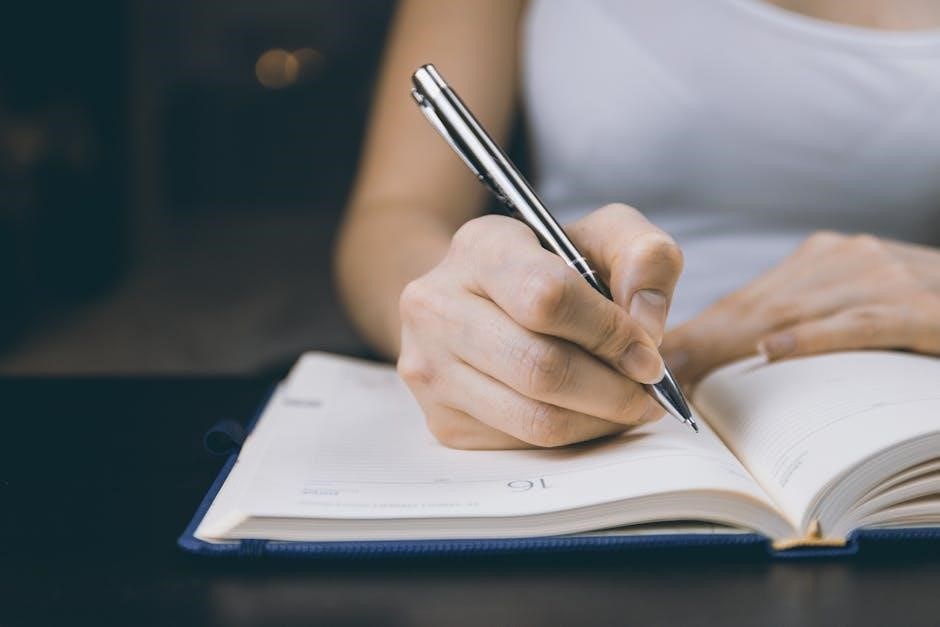resources to guide their thoughts and feelings about learning, with effective questioning techniques always;
Importance of Self-Reflection in Learning
The importance of self-reflection in learning cannot be overstated, as it allows students to develop a deeper understanding of their own thought processes and learning styles, using resources such as student self-reflection questions pdf. By incorporating self-reflection into their learning routine, students can identify areas where they need improvement and develop strategies to address these weaknesses. This process of self-reflection also helps students to recognize their strengths and build upon them, leading to increased confidence and motivation. Furthermore, self-reflection enables students to take ownership of their learning, setting goals and tracking progress, which is essential for academic success. Effective self-reflection also involves evaluating one’s own values and beliefs, and considering how these impact learning, with the use of pdf resources and questioning techniques to guide the process, leading to a more holistic approach to education. Additionally, self-reflection helps students to develop critical thinking skills, analyzing their own experiences and drawing meaningful conclusions. Overall, the importance of self-reflection in learning is clear, and its benefits can be seen in students’ academic achievement and personal growth. With the right tools, such as student self-reflection questions pdf, students can cultivate a growth mindset and achieve their full potential.

Benefits of Self-Reflection for Students
Self-reflection benefits students by improving academic performance, using pdf resources to enhance learning outcomes and skills always effectively.
Improving Self-Awareness and Identifying Strengths and Challenges
Improving self-awareness is crucial for students, and using pdf resources can help them identify their strengths and challenges, allowing them to set realistic goals and develop strategies for improvement. By reflecting on their experiences and thoughts, students can gain a deeper understanding of themselves and their learning styles. This self-awareness can help students to better navigate academic challenges and develop a growth mindset. Effective self-reflection can also help students to recognize their emotional and social strengths and challenges, leading to improved relationships and overall well-being. With the use of reflection questions and journaling, students can develop a greater understanding of themselves and their place in the world, leading to increased confidence and self-esteem. By providing students with the tools and resources they need to reflect on their experiences, educators can help them to develop into capable and compassionate individuals.
Sample Questions for Self-Reflection
Using pdf guides, students can explore their thoughts and feelings with effective questioning techniques to enhance learning always and gain new insights quickly and easily every day.
Beginning of Year Goals and Planning Reflection
At the start of the year, students can use pdf resources to reflect on their goals and plans, considering what they want to achieve and how they can improve. This process involves identifying strengths and challenges, and setting realistic targets. By using self-reflection questions, students can think critically about their learning and develop a growth mindset. Effective questioning techniques can help students to explore their thoughts and feelings, and to gain new insights into their learning. With the help of pdf guides, students can create a personalized plan for the year, outlining their goals and strategies for success. This reflective process can help students to take ownership of their learning and to develop a sense of purpose and direction. By reflecting on their goals and plans, students can set themselves up for a successful and fulfilling year.

Deep Self-Reflection Questions for Students
Students use pdf resources to explore values and goals, with profound questioning techniques helping them gain deeper insights into their thoughts and feelings about learning always.
Exploring Values, Goals, and Personal Growth
Students can explore their values, goals, and personal growth by using pdf resources that provide guided questions and exercises. These resources help students identify their strengths and weaknesses, and set realistic goals for improvement. By exploring their values and goals, students can gain a deeper understanding of themselves and develop a sense of purpose and direction. This can lead to increased motivation and engagement in their learning, as well as a greater sense of personal fulfillment. Using reflective practices, such as journaling or meditation, can also help students cultivate a greater sense of self-awareness and introspection, leading to greater personal growth and development. Additionally, students can use images and
- ordered lists
to organize their thoughts and ideas, making it easier to reflect on their values, goals, and personal growth.

Using Reflection Tools to Support Student Development
Using reflection tools supports student development with effective strategies and resources always available online.
Core Social and Emotional Learning Competencies
Core social and emotional learning competencies are essential for students to develop self-awareness and self-management skills, including self-reflection and goal-setting. These competencies are based on five key areas, including self-awareness, self-management, social awareness, relationship skills, and responsible decision-making. By using reflection tools and strategies, students can develop a better understanding of their own strengths and challenges, and learn to manage their emotions and behaviors effectively. This can be achieved through the use of student self-reflection questions pdf resources, which provide a framework for students to reflect on their learning and development. Effective reflection tools can help students to identify areas for improvement and develop strategies for achieving their goals, leading to improved academic and personal outcomes.

Encouraging Reflective Practice in Students
Encouraging reflective practice helps students develop critical thinking skills using pdf resources and effective questioning techniques always in learning.
Acquiring a Habit of Reflective Practice for Better Learning and Writing
Acquiring a habit of reflective practice is essential for students to become better learners and writers, using resources such as pdf guides to support their development. By incorporating reflective practice into their daily routine, students can improve their critical thinking skills, develop a growth mindset, and enhance their overall learning experience. Effective questioning techniques can also be used to encourage reflective practice, helping students to think deeply about their learning and identify areas for improvement. With consistent practice, students can develop a habit of reflective practice that will benefit them throughout their academic careers and beyond. By providing students with the tools and support they need, educators can help them acquire a habit of reflective practice that will serve them well in all aspects of their lives, including learning and writing.


